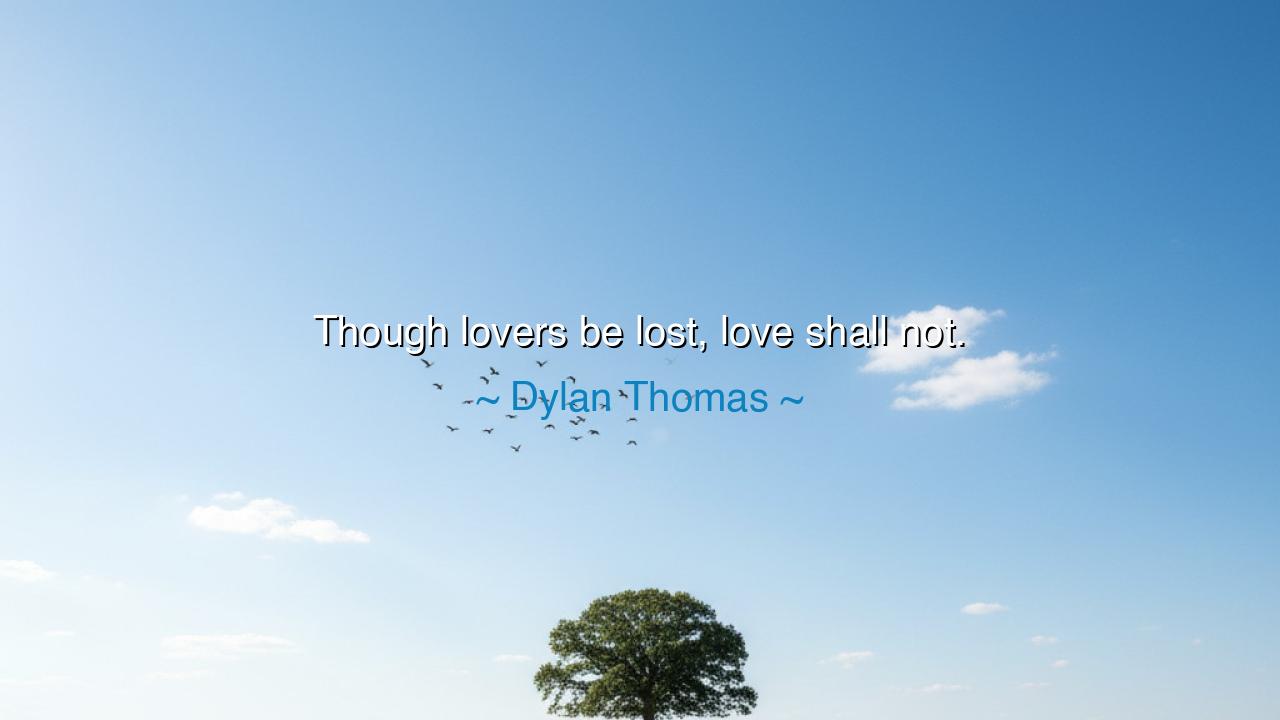
Though lovers be lost, love shall not.






When Dylan Thomas wrote, “Though lovers be lost, love shall not,” he spoke as a poet of eternity — one who saw beyond the frailty of human flesh into the immortality of the spirit. This line, from his poem “And Death Shall Have No Dominion,” was born from Thomas’s lifelong contemplation of death, faith, and the indestructible essence of life. In these seven words, he declares that while human beings — the lovers — must one day perish, love itself cannot die. For love, he reminds us, is not bound to time or body; it is the pulse of the universe, the divine current that continues even after the beating hearts that carried it have turned to dust.
Thomas, like the poets and prophets of old, wrestled with the mystery of mortality. His words are not meant to comfort sentimentally, but to proclaim a truth eternal: that love is greater than death. Where the body ends, love persists — in memory, in legacy, in the living fabric of creation itself. For love is not merely emotion; it is the creative force that brings life into being and binds all beings together. Lovers may be lost, he tells us — to distance, to time, to death — but love shall not, for it belongs to the realm of the infinite.
This wisdom echoes through the ages. The ancient Greeks spoke of Eros, the primal energy of life that survives every destruction. The mystics of the East called it Brahmanic love, the eternal flow that animates all things. And Christ, in his final hour, said that love is stronger than death, for love is of God. Dylan Thomas, with the heart of a mystic and the voice of a prophet, wove these timeless truths into poetry. He saw that love is not diminished by separation; it deepens in loss, because love’s true nature is self-giving — and what is given freely never dies.
History, too, bears witness to this immortal force. When Antony and Cleopatra perished, their kingdoms fell — yet their love became legend. When Romeo and Juliet died, their families were reconciled through the power of the love they once defied. When John Keats, dying young and forgotten, whispered his devotion to Fanny Brawne, his words outlived his flesh, carried through centuries by those who read his letters. The lovers passed — yet their love endured, not as ghosts, but as a living presence that continues to inspire. This is what Thomas means: that while life is transient, love transforms mortality into meaning.
But this truth is not only for romance. It belongs to every bond of devotion — between friends, between parent and child, between humanity and the divine. When one who loved us is gone, their love does not vanish; it lives within us as light, as courage, as memory. To live with love is to ensure that even death cannot silence one’s song. As Thomas says elsewhere, “Death shall have no dominion.” Love, once awakened, becomes eternal energy — reshaping grief into gratitude, and sorrow into strength.
And yet, to understand this truth requires faith — not in doctrines, but in the unseen. The world teaches that all things perish, that love fades, that death is the final victor. But the wise know better. Love transcends endings, for it is woven into the very pattern of existence. Even in loss, love multiplies — spreading through the hearts it has touched, through the kindness it inspires, through the beauty it leaves behind. The lovers are gone, but their love becomes the world’s inheritance.
So, my child, remember this teaching: cherish love not because it lasts forever in the flesh, but because it lasts forever in the soul. Love bravely, even knowing loss will come. Love deeply, even knowing time will pass. For each act of love — whether between two souls or between one heart and the world — is a spark of the divine. When you love, you participate in eternity. When you give love, you defy death.
Thus, as Dylan Thomas proclaimed, “Though lovers be lost, love shall not.” Let this truth be your anchor in grief and your anthem in joy. The lovers may fall, the days may end, but love — that radiant force which gives life meaning — abides forever. It is the flame that no darkness can extinguish, the pulse that beats beneath creation itself. And to live in love is to live beyond death.






AAdministratorAdministrator
Welcome, honored guests. Please leave a comment, we will respond soon